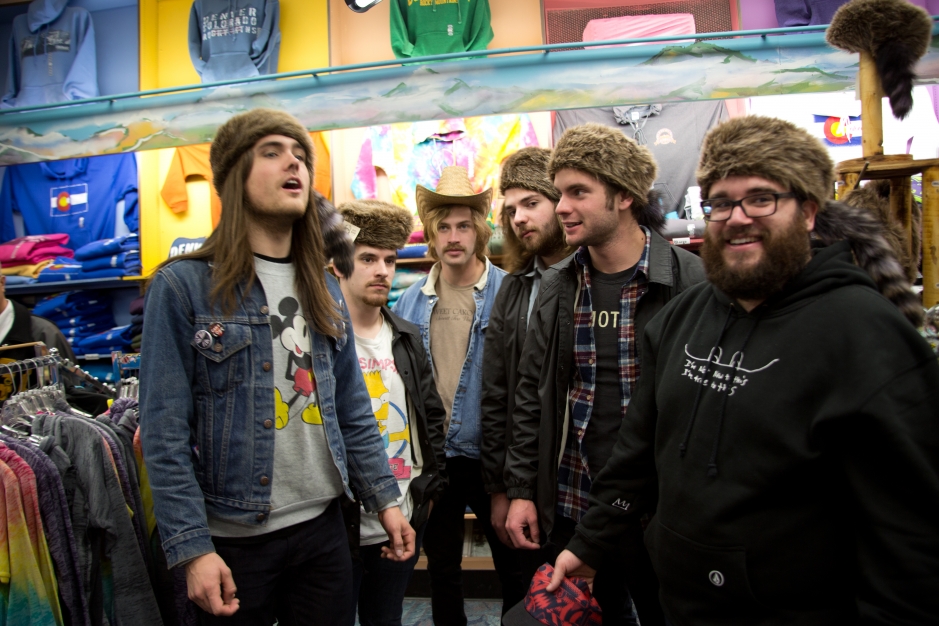“All these songs sound like bummer songs,” says Diarrhea Planet frontman Jordan Smith. “I promise I’m not that much of a bummer!” Smith’s Nashvillian pop-punk collective has developed a reputation for raucous live performances and a name that makes Butt Trumpet look like Belle and Sebastian, but second album I’m Rich Beyond Your Wildest Dreams is a hook-crammed explosion that draws from deep wells of loss and disillusionment. “Kids” is a slow-burning torch song that touches on the poignancy of growing up too fast; the late-’80s jukebox rock of “Babyhead” underpins a tongue-in-cheek confession of a love that can never be. Before its August 20 release date, we got Smith and fellow Diarrheans Brent Toler and Emmett Miller to break down Rich‘s four-guitar onslaught.
This album is no longer streaming.
“Lite Dream”
Jordan Smith, vocals/guitar: This is a really old song, essentially about a guy melding reality with the movie Heavy Metal, this cartoon that I was really obsessed with in college. I went through this heavy stoner phase, where I would get stoned and watch it every day for a summer. I also used to have this huge VHS collection, so it’s kind of about, that too, just like bits and pieces of tons of different songs.
“Separations”
Smith: It’s based super-heavily on conversations with a girl I was dating at the time. I was really discouraged with the long-distance aspect of it for a while — she’s from Texas. I was going through a rough time, but she encouraged me while also kicking my butt. That song is based on conversations of encouragement between us.
“The Sound of My Ceiling Fan”
Smith: I used to live with our drummer Casey in this really tiny house. We used to hang out a lot there, but he would always be working when I would be working, and the rest of the time it was super lazy. I was sitting in my room watching massive amounts of Curb Your Enthusiasm one time, and I looked up at the ceiling fan and was just staring at it. I had just graduated from college and wasn’t sure what I should be doing, and the ceiling fan was just telling it to me again. Just saying, like, “Hey dude, here’s you wasting your life.”
“Field of Dreams”
Brent Toler, guitar: This song I wrote for a band I was in before, but it had a lot of dynamics, so it wasn’t well-suited for them. I was young when I wrote it, 21. It was about people trying to force their opinions on other people, and me trying to get everyone to chill out and do their own thing.
“Kids”
Smith: Definitely the most depressing song I’ve ever written. It was about probably the worst time in my life, actually, when I was living at that house with Casey. It’s about really heavy things happening, and how it’s unfair to have to be really young and dealing with some of those things that age you really fast. I never want to go through something like that again.
“Hammer of the Gods”
Toler: When I wrote this, I was hanging out with the same two or three dudes every day, which got sort of boring. It’s about having a good time but feeling like you’re wasting time, too. I think Emmett said it was the most epic song ever written about hanging out.
“Ugliest Son”
Jordan Smith: I was reading 2666 by Roberto Bolaño. He’s one of those authors where every few pages you have to get on your phone or something and look up big words. The word “ineffable” came up, and I really liked it when I read it. I wanted to write a song about a bad guy who is so evil that it’s ineffable — you can’t put it into words. I wanted it to sound very dark. I was also really sick at the time. You know when you’re so sick you think, “Man, I just need to throw up a bunch of black stuff to feel better”? Like there’s some sort of poison in your body that needs to get out? So it’s about being really evil and really sick, too.
“White Girls”
Emmett Miller, guitar: There was a girl I was seeing whose last name was White. She ended up doing me wrong, and I thought it’d be funny to write a song as a follow-up to “Orange Girls” on our first record. This girl started flaking out on me, and we were at this karaoke bar in Nashville, and started getting heady and emotional. I was very upset when I was driving home, and I thought of it then.
“Togano”
Smith: I’m a huge fan of Japanese literature. I took it for three years in high school, and got really into Murakami and stuff. “Togano” is inspired by a book named Masks by Fumiko Enchi. It’s about a family of women whose surname is Togano. In the book, there’s a society where men have been really manipulated, because these women have pretended to be possessed by demons. And it’s this whole thing where the question is, are they really possessed, or are they using it as an excuse to manipulate people? That song doesn’t really has to do with any plot points, but that song is about forbidden love in feudal Japan, you know, between a peasant and a shogun. I wanted to write a song that could be in the soundtrack in a movie like that
“Enter the Great Gate”
Smith: We have a bad habit of writing huge intros to songs. I wrote this originally as an intro to “Babyhead,” and wanted to follow with the whole Japanese thing. There’s a second part to “Enter the Great Gate” called “Exit the Great Gate,” which was the outro to another song that wasn’t on the record.
“Babyhead”
Smith: It’s the only love song I’ve ever written. I wanted to write something that sounded like a jukebox hit. There’s a bar in Nashville we love called the Villager, and it’s super smoky in there. We each have five or six songs we each play when we’re there, and they’re songs that make you feel, like, really happy that you’re in a bar playing darts with your buddies. Bands like Boston, Foreigner. Classic jukebox songs that are pretty corny, but make you feel alive, like you’re standing at the edge of a promise when you’re at a bar. I wanted to carry that feeling. The actual lyrics are about completely loving somebody, but not being able to do anything. There was a girl I really loved in college, but I would never tell her because I didn’t want to ruin our friendship. It’s about being unable to communicate that love because you don’t want to ruin the friendship.
“Skeleton Head”
Smith: It’s about isolation. I spent so many days by myself in that house with Casey — it’s on the left side of Nashville, and I don’t know that many people around there. I was by myself a lot, and bummed out spending so much time by myself. That song is kind of about living in a house that has a lot of weird, bad memories, but you’re stuck there.
“Emmett’s Vision”
Smith: The first time we played in Cleveland, we didn’t have anywhere to stay. We met this girl there who was really cool. She used to live above a funeral home, and she invited us to stay there. So we went to this funeral home after we’d been drinking a lot, and we decide to explore downstairs. There was this painting of this dude who has some sort of skin disease, and his face is kind of rotten in the painting. And we were like, “Oh my god, so scary!” And we were kind of tipsy, so it was even more exaggerated. We went down even further in the funeral home. Then Emmett came running back out. He was freaking out because he had gone in this room and there was a dead body lying in a casket for a funeral the next day, He was so freaked out that he went back upstairs and played a classical concerto almost all the way through for all of us. It was super fun and kind of weird. So that song is about Emmett seeing a dead body and coming up and playing guitar.





